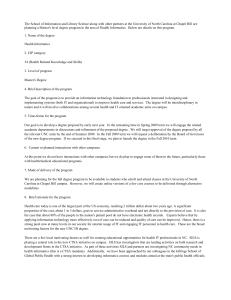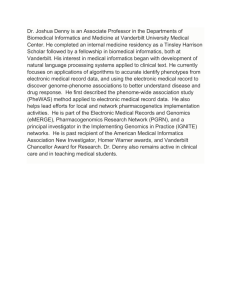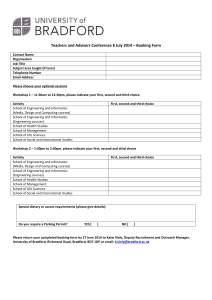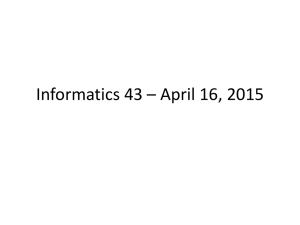HAIEC health informatics proposal
advertisement
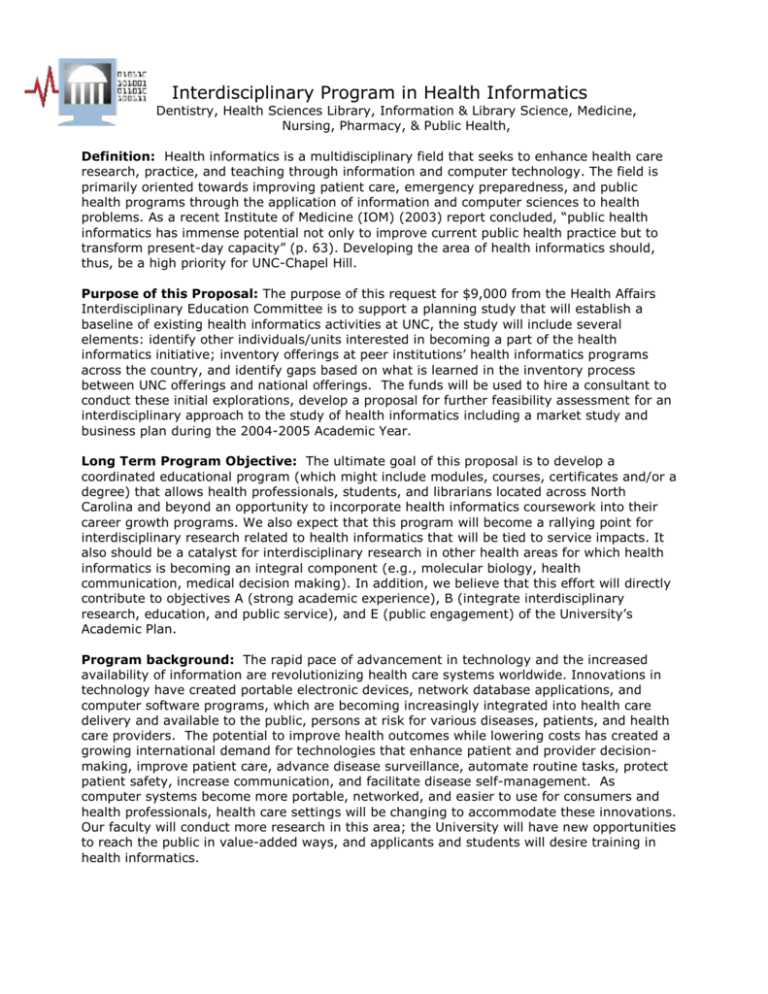
Interdisciplinary Program in Health Informatics Dentistry, Health Sciences Library, Information & Library Science, Medicine, Nursing, Pharmacy, & Public Health, Definition: Health informatics is a multidisciplinary field that seeks to enhance health care research, practice, and teaching through information and computer technology. The field is primarily oriented towards improving patient care, emergency preparedness, and public health programs through the application of information and computer sciences to health problems. As a recent Institute of Medicine (IOM) (2003) report concluded, “public health informatics has immense potential not only to improve current public health practice but to transform present-day capacity” (p. 63). Developing the area of health informatics should, thus, be a high priority for UNC-Chapel Hill. Purpose of this Proposal: The purpose of this request for $9,000 from the Health Affairs Interdisciplinary Education Committee is to support a planning study that will establish a baseline of existing health informatics activities at UNC, the study will include several elements: identify other individuals/units interested in becoming a part of the health informatics initiative; inventory offerings at peer institutions’ health informatics programs across the country, and identify gaps based on what is learned in the inventory process between UNC offerings and national offerings. The funds will be used to hire a consultant to conduct these initial explorations, develop a proposal for further feasibility assessment for an interdisciplinary approach to the study of health informatics including a market study and business plan during the 2004-2005 Academic Year. Long Term Program Objective: The ultimate goal of this proposal is to develop a coordinated educational program (which might include modules, courses, certificates and/or a degree) that allows health professionals, students, and librarians located across North Carolina and beyond an opportunity to incorporate health informatics coursework into their career growth programs. We also expect that this program will become a rallying point for interdisciplinary research related to health informatics that will be tied to service impacts. It also should be a catalyst for interdisciplinary research in other health areas for which health informatics is becoming an integral component (e.g., molecular biology, health communication, medical decision making). In addition, we believe that this effort will directly contribute to objectives A (strong academic experience), B (integrate interdisciplinary research, education, and public service), and E (public engagement) of the University’s Academic Plan. Program background: The rapid pace of advancement in technology and the increased availability of information are revolutionizing health care systems worldwide. Innovations in technology have created portable electronic devices, network database applications, and computer software programs, which are becoming increasingly integrated into health care delivery and available to the public, persons at risk for various diseases, patients, and health care providers. The potential to improve health outcomes while lowering costs has created a growing international demand for technologies that enhance patient and provider decisionmaking, improve patient care, advance disease surveillance, automate routine tasks, protect patient safety, increase communication, and facilitate disease self-management. As computer systems become more portable, networked, and easier to use for consumers and health professionals, health care settings will be changing to accommodate these innovations. Our faculty will conduct more research in this area; the University will have new opportunities to reach the public in value-added ways, and applicants and students will desire training in health informatics. The importance of informatics in the training of health professionals has been recognized in several important IOM publications, including the report cited earlier. A recent report on health professional education identified health informatics as one of eight areas of critical importance for the training of health care practitioners. (See Gebbie K et al. 2003. Health Professions Education: A Bridge to Quality, National Academia Press).The report notes that: “Some level of informatics training for both new and existing … health workers is essential.…a basic understanding of public health informatics is critical for effective practice in the information age (p. 64).” Interested Parties: A critical mass of faculty from all of the Health Affairs Schools, the Health Sciences Library, the School of Information and Library Science, and the Friday Center has formed a steering committee to explore the development of a new interdisciplinary program in health informatics. The commitment to this venture is evidenced by the development of a new online interdisciplinary Health Informatics Course, which is currently being offered under the auspices of the Schools of Pharmacy and Public Health with Scott Smith and Tina Brock as lead instructors. In addition, Joanne Marshall is leading this current effort to investigate the feasibility of an interdisciplinary program in health informatics. Joanne’s background as Dean of the School of Information and Library Science, scholar in health science information, and President Elect of the Medical Library Association particularly positions her to lead this effort. Table 1 below presents the names and affiliations of UNC faculty who comprise this steering committee. Table 1. Health informatics program faculty and librarians Dentistry Friday SILS HSL Nursing Pharmacy Center Sharon Linda Carl Claudia Julia DeeDee Tina Brock Greyden Gollop ShawBoyington Kokot Stephen Barbara Barrie Scott Bayne Wildemuth Hayes Smith Joanne Carol Marshall Jenkins Catherine Linda Blake Collins Paul Solomon Public Health Kurt Ribisl Medicine Eve Juliano Dave Potenziani Todd Nicolet Barbara Rimer Sandra Greene (Adjunct; Sheps Ctr.) History and Rationale: Through the support of an NIH National Library of Medicine grant (1997), the Health Sciences Library and School of Information and Library Science (SILS) conducted a marketing study (including an expert advisory group of ten members, interviews with seven expert professionals, and a Delphi study of 26 employers and 25 mid-career information professionals). The results showed enthusiastic interest in and need for a health informatics certificate program based at the University of North Carolina at Chapel Hill. The study also identified applicable content for a health informatics specialization that would draw upon courses in SILS and other Schools and Departments. Likewise, a subcommittee comprised of faculty from the UNC Schools of Medicine and Public Health identified eleven high priority teaching areas including informatics, which are critical for ensuring that instruction at UNC is progressive and continues to meet the expanding needs of the populations that we serve. Also, the School of Nursing is currently involved in identifying core informatics competencies related to all levels of the curriculum from BSN to PhD. These UNC efforts complement those described in the Institute of Medicine Report and emphasize that improving informatics instruction is both a national and regional priority. In addition to addressing informatics as a content area, the Committee on Educating Public Health Professionals for the 21st Century (see reference above) further suggests that a holistic approach is necessary for implementing such an innovative curriculum, emphasizing the power and efficiency of interdisciplinary and collaborative training. Indeed, despite the increasing use of technology by the UNC Health Care System for both patient care and research and the sustained interest in informatics at UNC, over the past five years faculty attrition and challenges to collaborative communication have hampered the progression of this innovative agenda and isolated efforts to provide this important instruction. In response to this, the interested parties listed above (among others) have collaborated to undertake preliminary planning for health informatics certificate. The group has completed an assessment of the currently available informatics coursework at UNC and has been exploring the merits of certificate prototypes for feasibility. Budget: $9,000 to pay a consultant to develop a baseline of information on current courses and interested faculty at UNC, a national overview of health informatics programs as well as to develop a plan for further feasibility assessment and development of a marketing/business plan for an interdisciplinary program in health informatics. The Deans of Dentistry, Nursing, and Pharmacy have all agreed to include a sentence of support in their 2004-2005 budget submissions to the Provost for follow up to the work supported by this proposal. Current informatics courses offered at UNC*: NURS 117: Health care informatics (online, fall) HPAA 155: Public health informatics (online, fall) HBHE 295: The Internet and public health (residential, fall) HPAA 256/EPID 140/PPES 254: NEW-Informatics: Use of large health care databases (residential, fall) MEDI 134: Preclinical informatics PHCY 616/PUBH 616: NEW–Health informatics (online, spring) *Note: The numerous courses in the various Health Science Schools and SILS, which include some informatics content, are not included in this list. Example Programs: 1) Three Core Courses Plus Elective Computer Technology Core: Nuts and Bolts HPAA 155 INLS 225 INLS 110 HBHE 295 HPAA 256 Public Health 2) Public Health or Clinical Specialist Theoretic Concepts: Informatics and Information Systems Applications: Software & Hardware e.g., PDA , HTML Computer Technology Core: Nuts and Bolts NUR 117 PHCY 120 HPAA 155 OR Clinicians Public Health HBHE 295 HPAA 256 Theoretic Concepts: Informatics and Information Systems Applications: Software & Hardware e.g., PDA , HTML PHCY 120 Dentistry Nursing Pharmacy SILS/HSL NUR 117 PHCY 101 INLS 225 INLS 110

